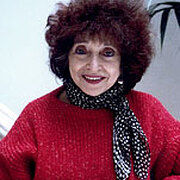Tana Hoban (1917–2006)
Autor(a) de 26 Letters and 99 Cents
About the Author
Tana Hoban was born in Philadelphia, Pennsylvania. She has also lived in Holland and England. Hoban graduated from Moore College of Art in Philadelphia in 1938, and painted in Europe as a recipient of the John Frederick Lewis Fellowship. When she returned to Philadelphia, she worked as a free-lance mostrar mais advertising artist and magazine illustrator. By 1950 her work was included in the permanent collection of the Museum of Modern Art in New York City, and in 1953 she was the only woman mentioned in a Time magazine portfolio on "Half a Century of U.S. Photography." In 1959 she was named one of the Top Ten Women Photographers by the Professional Photographers of America. Hoban worked as an instructor in photography at the Annenberg School of Communications at the University of Pennsylvania from 1966 to 1968. In 1967 she produced and filmed Catsup, an award-winning film which was shown at the Venice Film Festival. By 1955, she had written a book on photographing children, and in 1970 she combined her skills as a photographer with her interest in children to produce her first juvenile picture book, Shapes and Things. In 1973, Hoban served as project photographer for Beginning Concepts, a series of sound filmstrips produced by Scholastic Magazines, Inc. From 1974 to 1976 she taught photography at New York University. As of 1990, five of her books had been listed as ALA Notables. She has received awards for her entire body of work three separate times. In 1991, she was awarded an Honorary Doctorate of Fine Arts from her alma mater, the Moore College of Art. Her works are included in the Kerlan Collection at the University of Minnesota and the Bibliotheque Nationale in Paris, among other collections in both the United States and France. (Bowker Author Biography) mostrar menos
Obras por Tana Hoban
Raising a reader :ITE #3 19 exemplares
Let's compare 7 exemplares
Bianco e nero 1 exemplar
Look! 1 exemplar
Giallo, rosso, blu. Ediz. illustrata 1 exemplar
Associated Works
Etiquetado
Conhecimento Comum
- Data de nascimento
- 1917-02-20
- Data de falecimento
- 2006-01-27
- Sexo
- female
- Nacionalidade
- USA
- Local de nascimento
- Philadelphia, Pennsylvania, USA
- Local de falecimento
- Paris, France
- Locais de residência
- Paris, France
- Educação
- Moore College of Art and Design
- Ocupações
- photographer
children's book illustrator - Relações
- Hoban, Russell (brother)
Fatal error: Call to undefined function isLitsy() in /var/www/html/inc_magicDB.php on line 425- Tana Hoban was born in Philadelphia, Pennsylvania to a Russian immigrant family. Her brother Russell Hoban grew up to become a writer. Tana attended high school in Lansdale, and took art classes at the Philadelphia School of Industrial Art on weekends. In 1938, she graduated from the School of Design for Women, now Moore College of Art and Design. She won a scholarship to travel and study painting in England and The Netherlands. She began taking photos for the window of her mother's shop. She worked briefly as a freelance graphic artist and illustrator before embarking on a career in photography. In 1946, Tana and her first husband Edward Gallob opened a studio in West Philadelphia. She took photos as illustrations for magazines, including The Saturday Evening Post, and then became an advertising photographer.
She also published her photos in books; among the earliest was a do-it-yourself book called How to Photograph Your Child (1953). She contributed to the Greystone Encyclopedia of Photography in 1963. Her photographs of children, which became her specialty, eventually were exhibited at the Museum of Modern Art and at various shows mounted in Philadelphia, New York, Paris and Berlin. She progressed from photographs of children to photographs for children.
Beginning in 1970, she wrote, designed, illustrated and published more than 110 children's books, which won many awards, such as the Children’s Literature Citation from Drexel University and the Free Library of Philadelphia in 1983, and a lifetime achievement award from the American Society of Media Photographers in 1998. Her pioneering works for children ranged from alphabet books like A, B, See! (1982), to primers like 26 Letters and 99 Cents (1986), to books that taught children about the world around them such as Circles, Colors and Squares (1974), Is It Larger? Is It Smaller? (1985), More Than One (1981), and I Read Symbols (1984).
Membros
Críticas
Listas
Prémios
You May Also Like
Associated Authors
Estatísticas
- Obras
- 57
- Also by
- 3
- Membros
- 7,751
- Popularidade
- #3,142
- Avaliação
- 3.5
- Críticas
- 320
- ISBN
- 232
- Línguas
- 5
- Marcado como favorito
- 2





























No words, just pictures!
...man I really am going to mess with my GR stats, aren't I